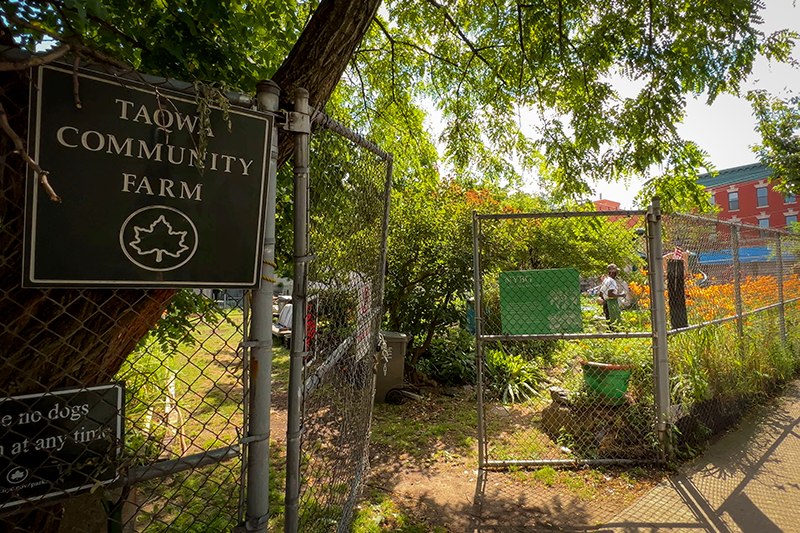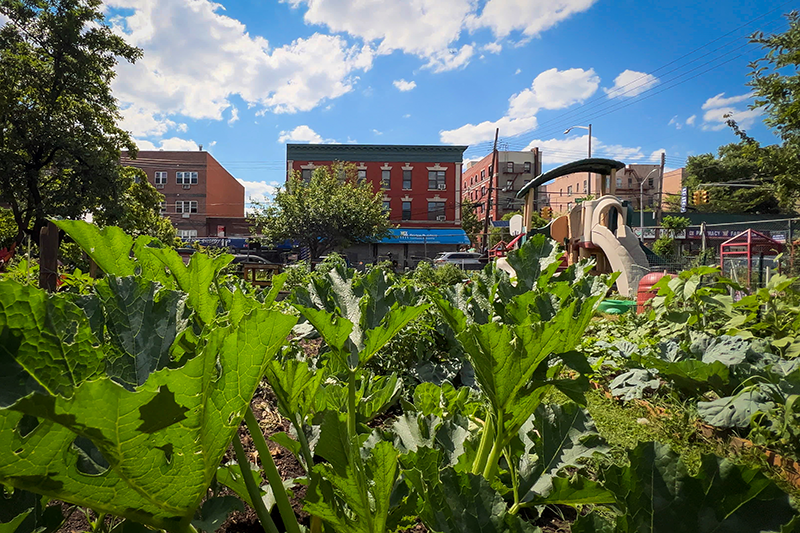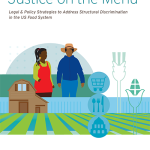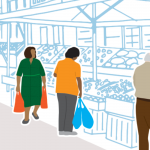By Kimberly Libman, Spring Cutter & Nessia Berner Wong
Food should nourish our bodies, strengthen community connections, and provide a sustainable income for the millions of people working throughout the food chain. But much of the current food system in the United States runs counter to these values. The racial discrimination that is woven into the food chain entrenches inequities at every level — for example, access to land for food production, availability of retail venues for healthy food, pay and benefits for food workers, and diet-related health outcomes.
However, rising awareness of inequities is creating momentum for meaningful change. Community-led innovations, new research perspectives, and a promising food policy landscape offer hope for accelerated progress toward a more racially just food system.
ChangeLab Solutions is harnessing these developments and building on the learnings from our equity-focused projects as we embark on a new project that will focus our efforts further upstream toward root causes of inequity, integrate emerging frameworks and insights from the field of food justice, and identify legal and policy strategies to transform the food policy landscape in ways that advance racial justice.
Working at the Intersection of Food, Health & Racial Justice
We believe that the most powerful risk factors in health are laws and policies that have perpetuated racism, discrimination, and segregation throughout our nation’s history. In the past five years, our strategic framework has focused further upstream as we work to dismantle five fundamental drivers of health inequity: structural discrimination, income inequality and poverty, disparities in opportunity, disparities in political power, and governance that limits meaningful participation.
Structural discrimination is a foundational driver of health inequity that operates across all the other drivers of inequity. Accordingly, across all of our work areas, we focus on centering racial equity, which we define as the process of changing policies, practices, systems, and structures to eliminate racial disparities and prioritize measurable improvement in the lives of people of color.
Our work in food systems supports equity-oriented strategies for action to address the five drivers of inequity as they operate across the food chain. At the heart of these strategies is a human-centered approach to identifying and prioritizing interventions that will create the most benefit for communities that experience the highest burden of poor health. Our approach to our work in the food sector is informed by three core learnings that have surfaced from our direct work with communities:
- The stigma inherent in many food system interventions can both create and perpetuate health harms.
- Black, Indigenous, and other people of color (BIPOC) continue to face exclusion from both governance and policymaking processes that affect food systems; therefore, BIPOC experiences must be centered in solutions.
- Due to the multifunctional and intersectoral nature of food systems, past and current injustices in other policy areas — including land dispossession, housing segregation, and criminalization — manifest in food systems and their outcomes, making cross-sector solutions essential to creating a more racially just food system.
Our key learnings inform our recent projects at the intersection of racial equity and food systems:
Food in carceral settings. The racial disparities in the US criminal legal system are severe; research has shown that Black Americans are incarcerated in state prisons at nearly five times the rate of white Americans. Consequently, carceral food environments are an important setting for advancing racial justice. Incarceration can have profoundly negative effects on the mental and physical health of individuals both during incarceration and after release, and it can also affect the health outcomes of immediate family members, contributing to adverse health impacts at a community level. Our work related to carceral food environments identifies pathways to increase the use of fresh, local produce in correctional facilities in order to improve food environments and include incarcerated individuals and their families in food policy development. In 2020, we published an issue brief, Leveraging Juvenile Justice Food Environments to Advance Health Equity, with the support of Healthy Eating Research, and in 2023, we partnered with Impact Justice and the Nutrition Policy Institute to produce three research briefs on farm-to-corrections opportunities in California. The long-term objectives of our work in this area include improving nutrition and health for people who are incarcerated by offering whole foods in carceral facilities; providing work experience that facilitates employment in the food system when residents return home after incarceration; and expanding the scale of procurement efforts to support local agriculture and BIPOC-owned food enterprises.
Food system governance. Historically in the United States, food was a primary tool for colonization and enslavement, the effects of which still resound today. Our current food systems and their associated racial, economic, and health inequities reflect a culture of land dispossession and erasure of traditional foodways. Repairing this legacy requires rebalancing the distribution of political power in systems of food governance. ChangeLab Solutions is partnering with the Johns Hopkins Center for a Livable Future, the Kirwan Institute for the Study of Race and Ethnicity, and the Interaction Institute for Social Change to facilitate a two-year community of learning and practice among food policy councils focused on racial, economic, and food justice. We also provide technical assistance on food action planning processes to help communities embed equity in every phase of policy development. One goal of these food governance initiatives is to ensure that BIPOC communities have meaningful participation in setting food policies that repair past harms, advance economic justice, and ensure access to culturally significant foods and foodways.
Trauma-informed approaches to food policy. Trauma-informed approaches recognize that food insecurity is experienced as trauma, which can have significant impacts on youth development and health. In the context of racial and health equity, applying a trauma-informed framework acknowledges that deeply entrenched structural inequities can cause trauma for certain racial and ethnic groups. Our exploratory research in this area focuses on how administrative policies of food assistance programs like the Special Supplemental Nutrition Program for Women, Infants, and Children (WIC) are potential points for intervention to prevent trauma and re-traumatization. Applying this framework could help preserve WIC participants’ autonomy over their bodies and their babies; empower women through meaningful participation in formulation of food packages; and establish standards for state and local implementing agencies to solicit WIC participant feedback on program administration, food packages, and breastfeeding supports. Over the long term, implementing this approach could improve WIC utilization, benefit maternal and child food security, and increase the capacity of implementing agencies to address equity.
While our research thus far has been exploratory, projects that work to transform the food system are increasingly applying a trauma-informed framework to food policy. A project from our partners at the Johns Hopkins Center for a Livable Future offers an additional example of work at this nexus. Through a collaboration with the Baltimore Food Policy Initiative, community leaders, and food systems stakeholders, they worked to develop the Baltimore Food System Resilience Advisory Report, which aims to strengthen the resilience of the city’s food system and alleviate the traumatic impact of food insecurity. The report applies Elizabeth A. Bowen and Nadine Shaanta Murshid’s foundational framework for trauma-informed social policy to food policy development.
Momentum for Policy Change
The current policy landscape provides an opportune moment to advance racial justice within our food system. President Biden has initiated federal action through Executive Order 13985, which established that the federal government should pursue a comprehensive approach to advancing equity for all. As a result, federal agencies, including the US Department of Agriculture, have engaged stakeholders and invited public comments in efforts to develop agency-specific equity action plans. In September 2022, the White House held its first Conference on Hunger, Nutrition, and Health in more than 50 years and released a national strategy to reduce hunger and diet-related disease by 2030. The ambitious five-pronged approach laid out in this strategy seeks to improve food access and affordability, integrate nutrition and health, empower consumers to have access to healthy choices, support physical activity for all, and enhance nutrition and food security research. While some actions to advance the national strategy have been taken since its launch, it will be important for advocates to ensure that progress is made toward its intended effects, particularly within our politically fraught landscape.
As the 2023 Farm Bill takes shape for reauthorization — which will fund many food and nutrition security programs, such as the Supplemental Nutrition Assistance Program (SNAP) — reflecting on the persistence of structural racism in our food and agricultural systems can inform this federal legislation as a tool for advancing food justice. Deciding what goes into the Farm Bill is an extensive process; as stakeholders engage in conversations with congresspeople, historical tensions among advocates representing a variety of urban and rural perspectives on hunger and nutrition rise to the surface and highlight a need for new approaches to resolving entrenched inequities.
These and numerous other federal initiatives are set against a larger cultural backdrop, given that the COVID-19 pandemic alongside waves of civil unrest in response to police murders of unarmed Black people have sharpened health equity advocates’ and scholars’ attention on the long history of structural racism in the United States as well as the need for action to advance racial equity across the social determinants of health.
Emerging Frameworks in Food Justice
Harnessing the momentum for policy change and accelerating progress in the food sector will require centering new approaches that reframe our understanding of how food systems and racial equity intersect. We are engaging with three emerging perspectives that inform our work at this nexus:
Racial capitalism asserts that racial distinctions were created to rationalize inequitable distributions of power and resources. This understanding of the design and maintenance of racial hierarchy as a core function of capitalism highlights how struggles for health equity and racial and economic justice are intertwined. According to this framework, advancing health equity or economic development without simultaneously centering race will inevitably reinforce racial inequality and associated systems of oppression.
Worker-owned cooperatives provide an example of how concepts of racial capitalism can inform our food systems work. Cooperatives use values-driven business models that center worker and community benefits in their mission and operations. In contrast to traditional businesses, workers who are also the owners of a cooperative participate in the oversight and management of the enterprise, using democratic practices, and they can share in the profits. The population of precariously employed workers in US food systems disproportionally includes women, immigrants, and BIPOC individuals. Worker-owned food cooperatives can advance racial justice within the food system by improving wages for food workers, providing venues to participate in food governance, and supporting community-driven food retail in places neglected by private industry. Moreover, cooperatives’ historical legacy in Black communities and the food and agriculture sector emphasizes their potential as a strategy for change at the intersection of racial justice and food systems. In our research recognizing cooperative ownership as an approach to health justice, we have examined and compared state-level laws and policies that can affect financing options for worker-owned cooperatives.
Another emerging perspective to inform how we evolve our work on food systems is the critique that anti-fatness is a form of anti-Blackness. Racist perspectives on eating and body size stemming from the slave trade have long served to distinguish between the virtues of white Europeans and the inferiority of African slaves. These views have been codified in public health and social policy to justify subjugation, coercion, and violence toward BIPOC communities. Modern public health’s framing of obesity and fatness as an epidemic has supported public policy and programs focused on the role of the individual — education about and access to healthy eating, exercising, and making better decisions — which reinforce pervasive social stigma associated with body size, which is associated with its own unique negative health outcomes. Experts have argued that the metric of body mass index (BMI) — the ratio of a person’s weight to their height — does not take into account a variety of factors, including bone density; muscularity; and genetic, cultural, or environmental influences. As a result, the universal application of BMI also contributes to discrimination by medical professionals against Black and brown people with big bodies in ways that further contribute to racial and ethnic health inequities. The experiences and perspectives of Black and brown people, especially those with big bodies, should be centered in food systems solutions.
The Future of Food Justice Work
Addressing how structural racism has shaped food systems and inequitable health outcomes is critical to reversing the health gaps experienced in BIPOC communities and communities with low income. We are therefore embarking on a new project that aims to synthesize the collective knowledge of food system stakeholders, scholars, and leaders from frontline communities to develop a new understanding of the relationships between structural racism and food systems and identify opportunities to catalyze justice and health.
We know that law and policy change is a long game; strong relationships sustain engagement and focus on solving complex, deeply rooted health inequities. Over the next year, we will be facilitating relationship-building activities across sectors with leaders from frontline communities, practitioners from national organizations, advocates, and critical scholars whose work may not have been centered in traditional public health spaces. Together, we will reflect on how previous research and policy approaches related to nutrition and obesity have contributed to unintentional harms as we examine the interplay between structural racism, food systems, and health. Our findings and insights will be translated into blog posts and actionable policy resources to help states and localities advance racial justice across the food system. We invite you to join us on this journey toward food justice.
Support for this resource was provided by the Robert Wood Johnson Foundation. The views expressed here do not necessarily reflect the views of the Foundation.
8/10/2023



